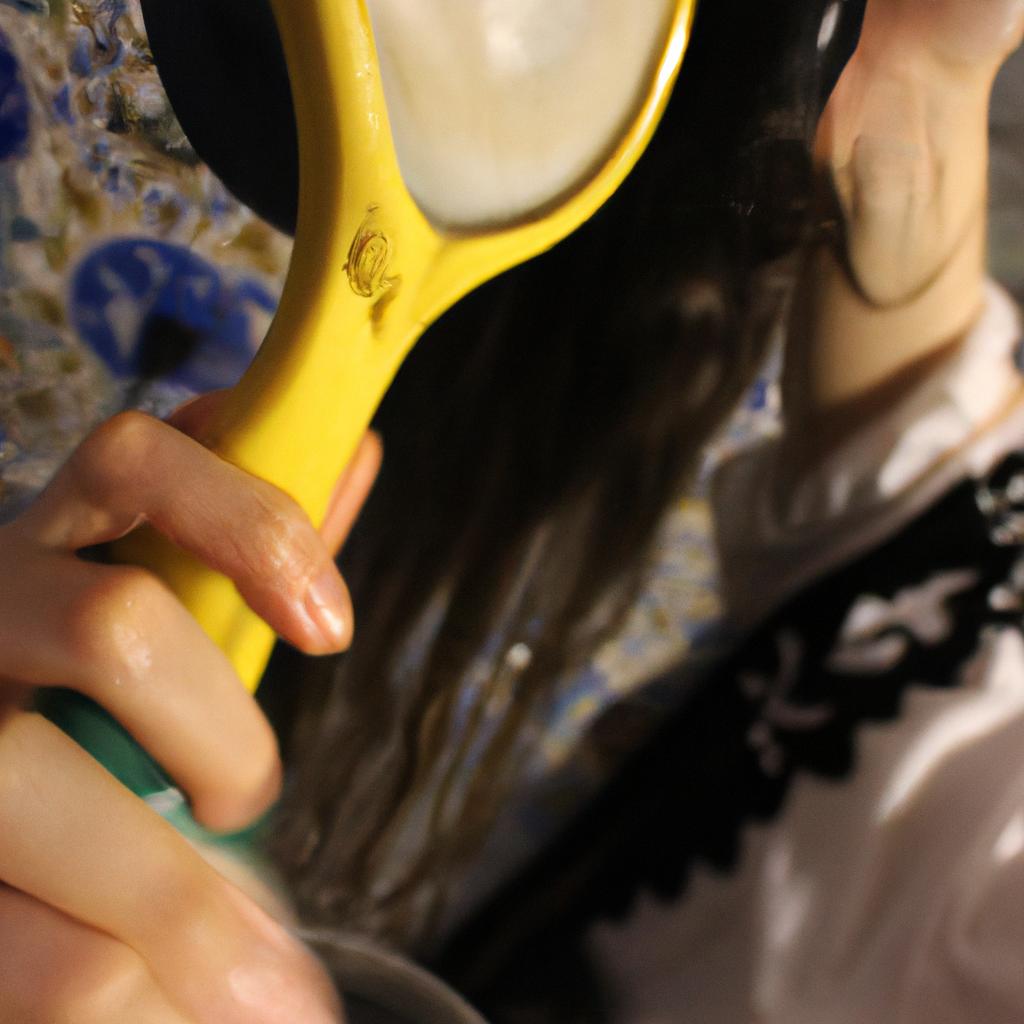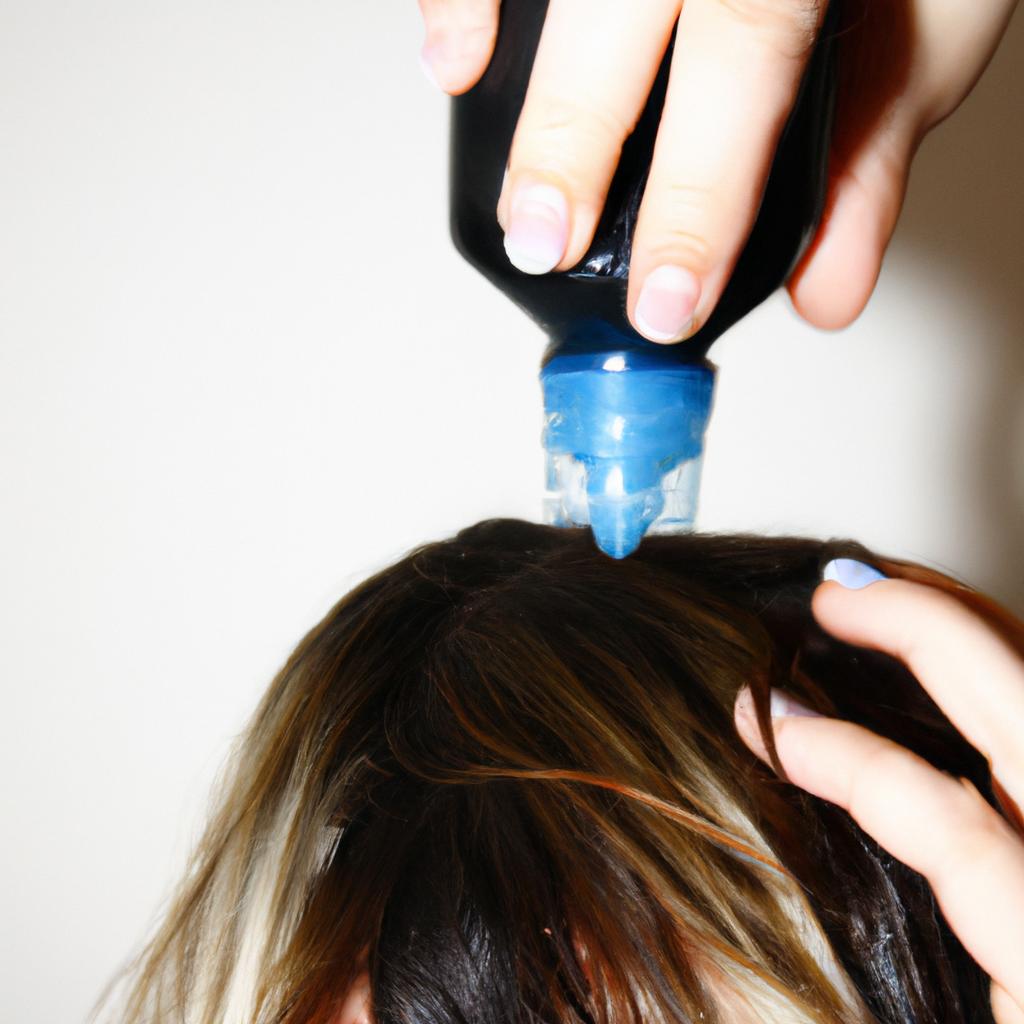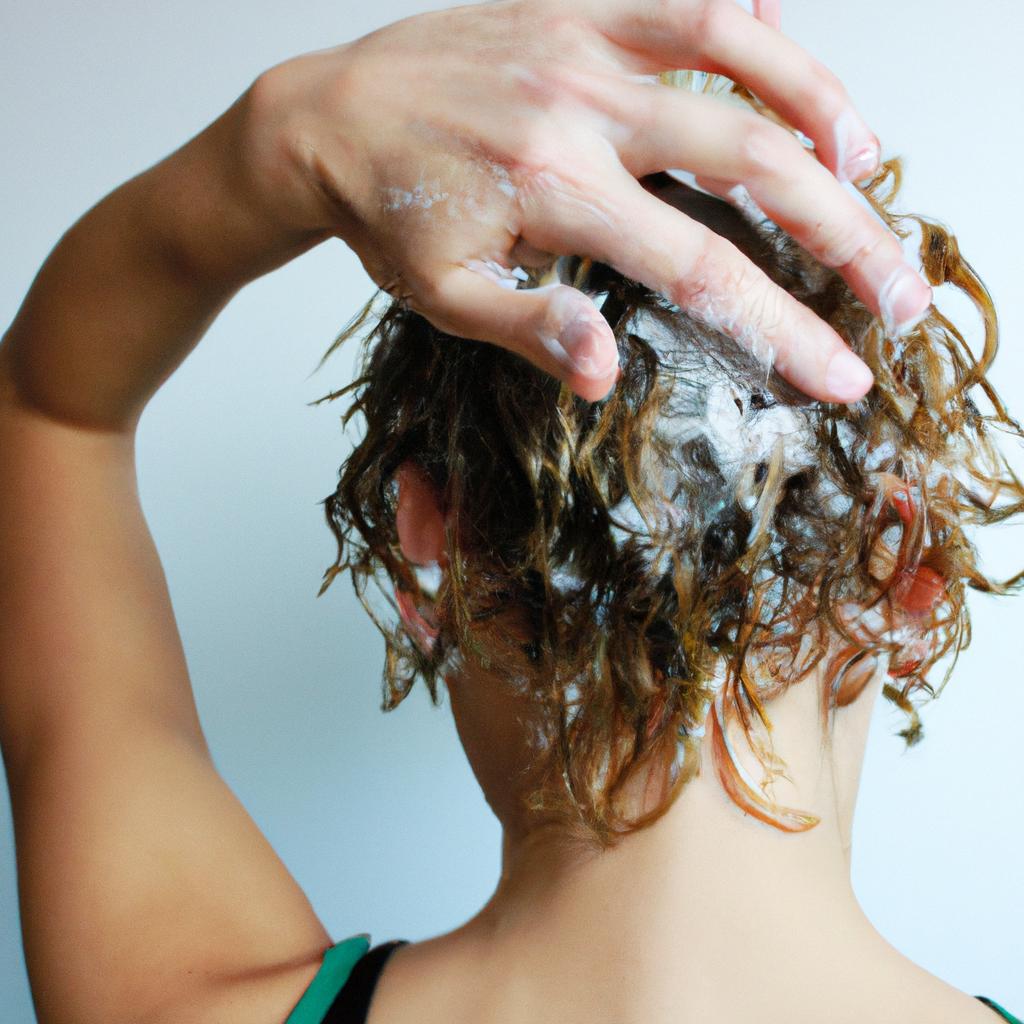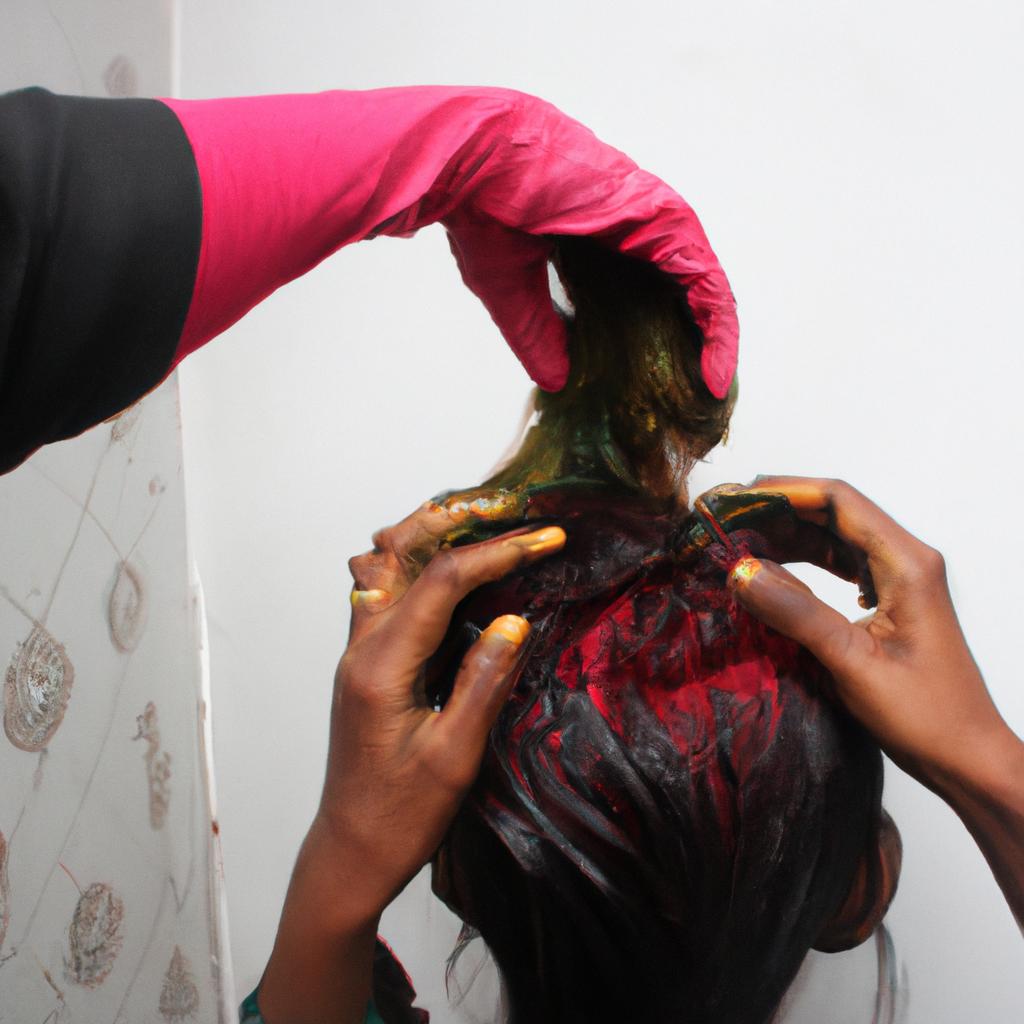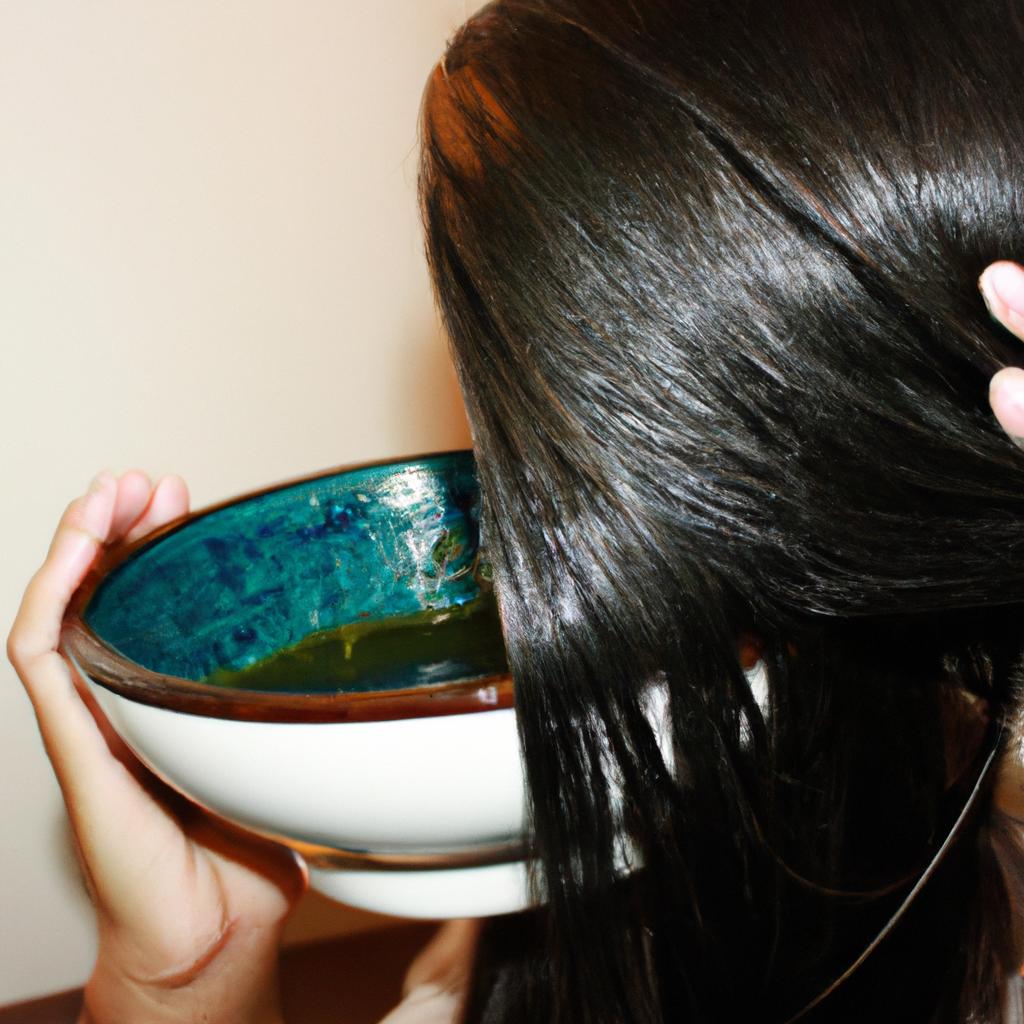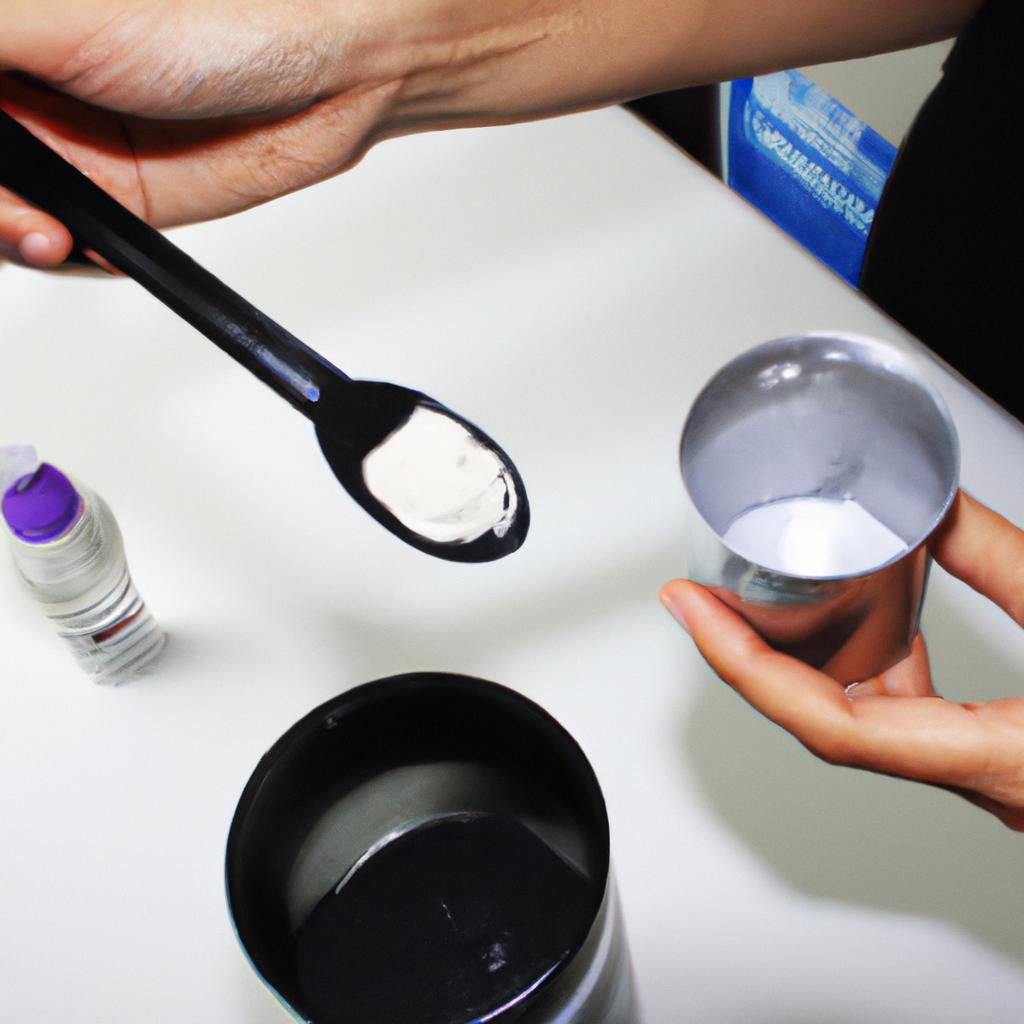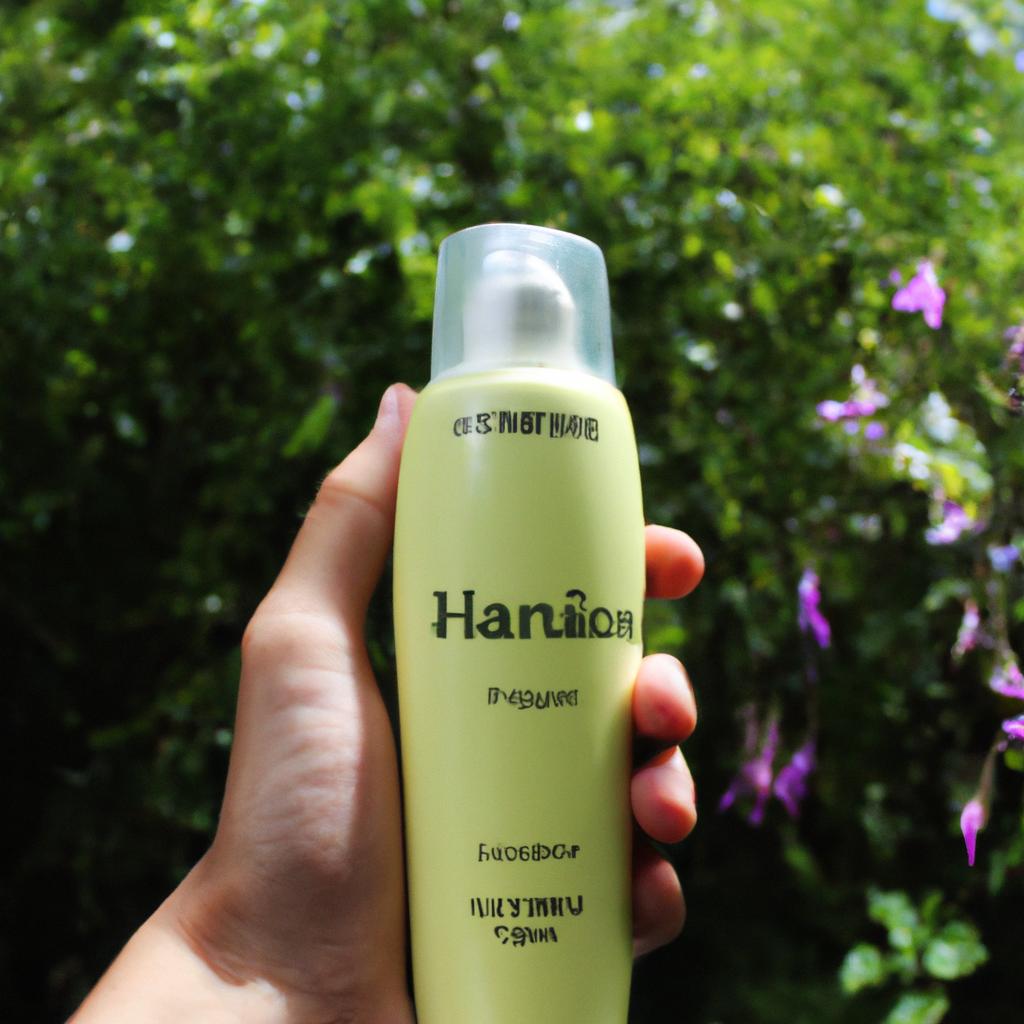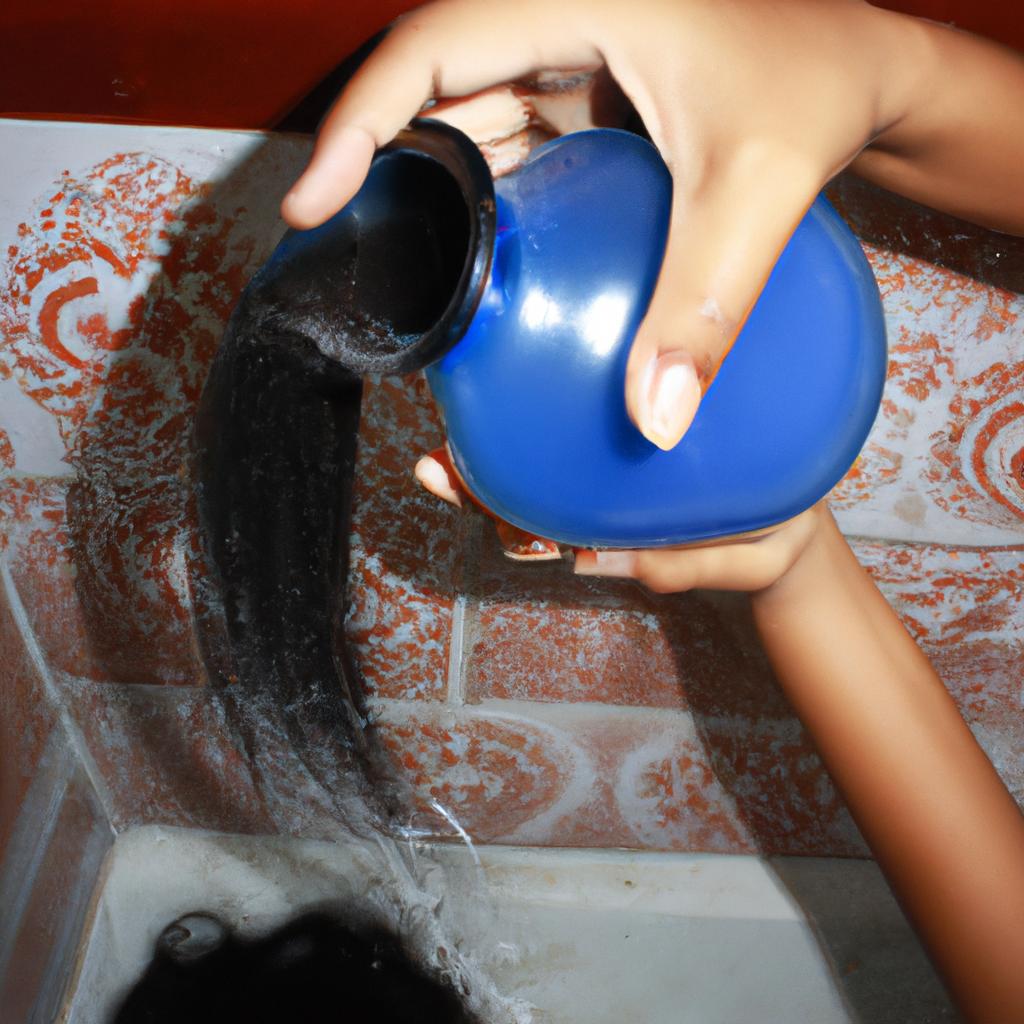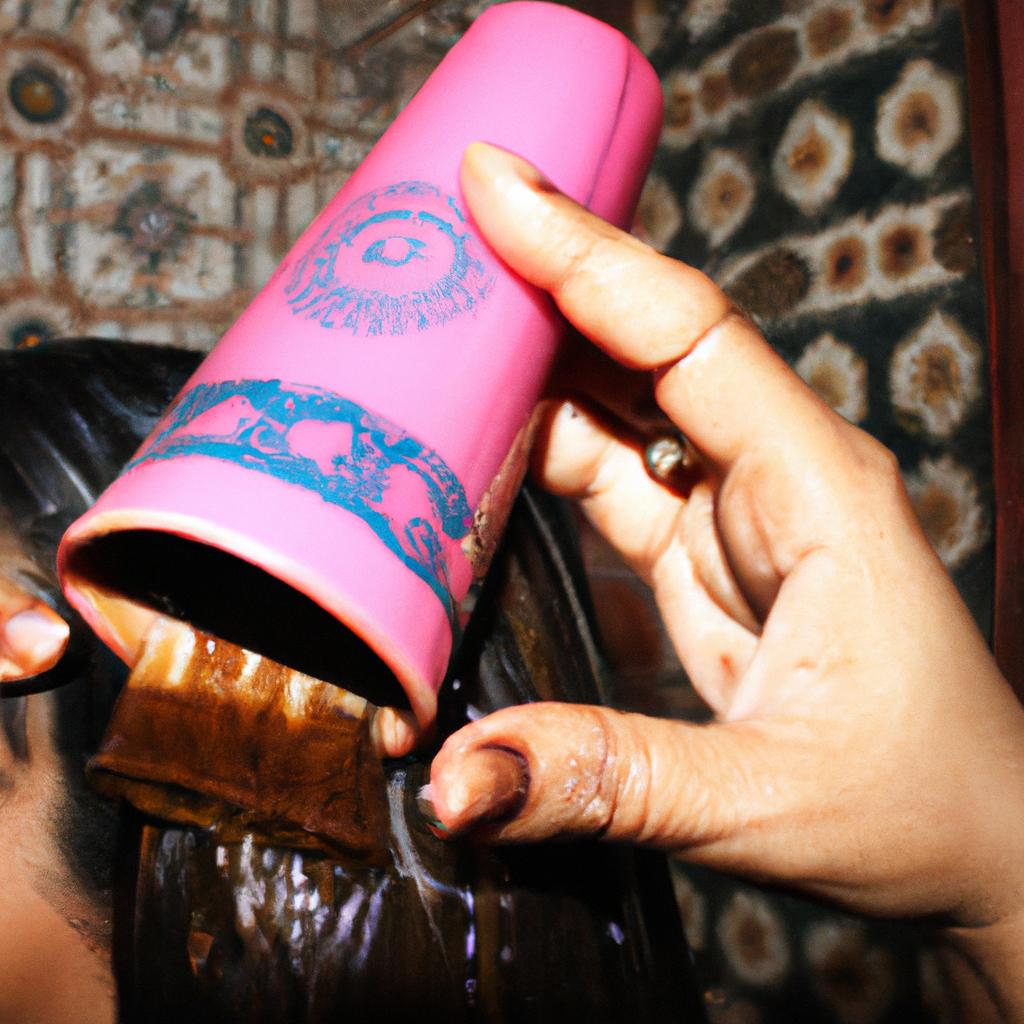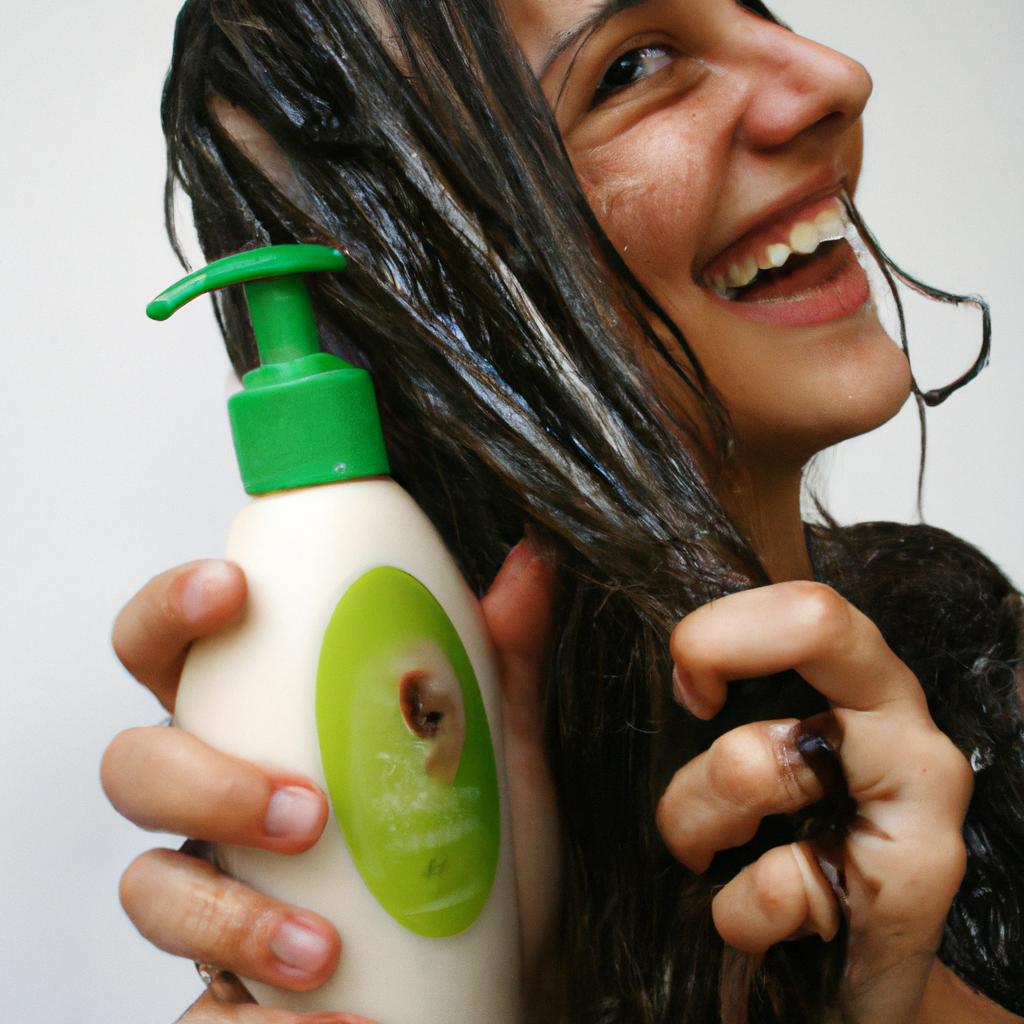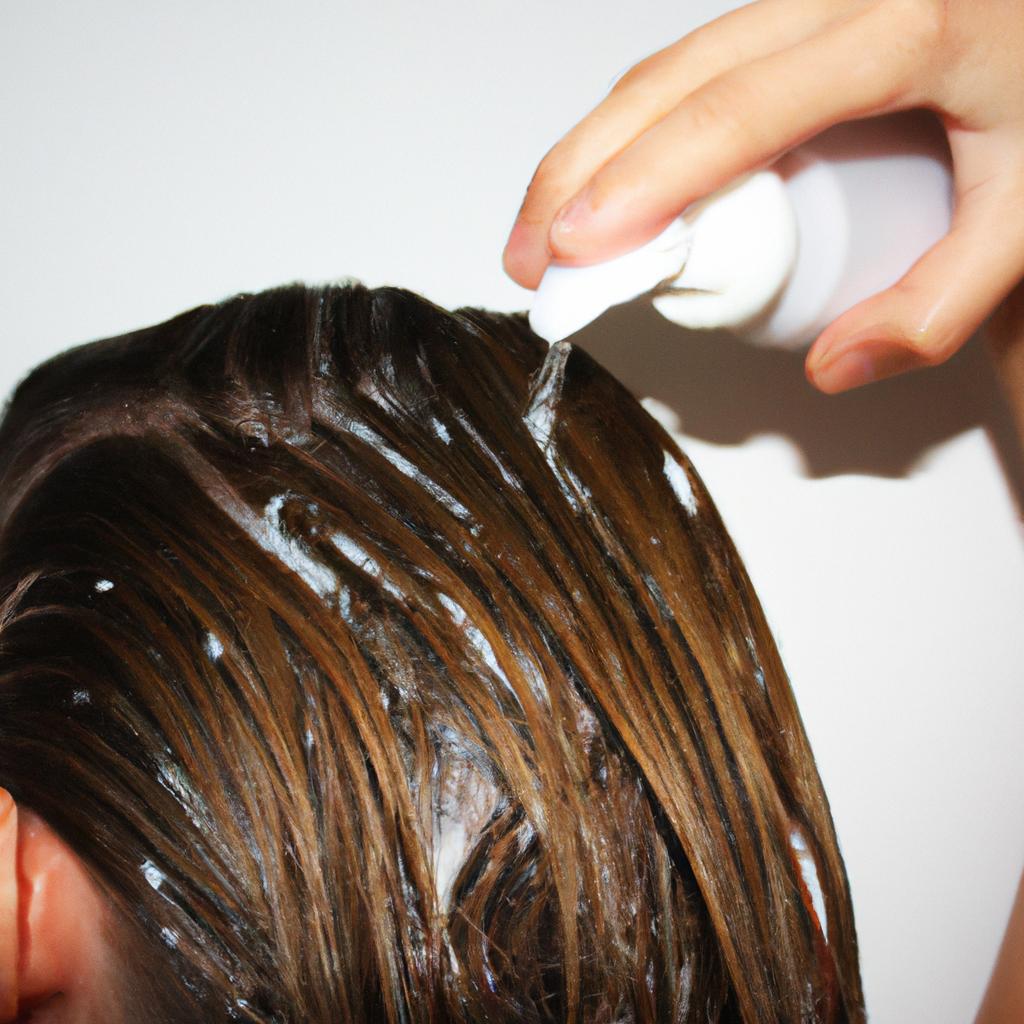Haircare rituals are an integral part of traditional Indian weddings, with particular emphasis placed on the use of natural ingredients for hair cleansing and nourishment. One such shampoo used in these ceremonies is made from a combination of all-natural substances that have been passed down through generations. For instance, let us consider the case of Radhika, a bride-to-be who decided to incorporate this traditional shampoo into her pre-wedding preparations. This article aims to explore the significance and effectiveness of this unique haircare ritual, shedding light on its historical roots and potential benefits.
The use of traditional Indian shampoo during wedding preparations signifies more than just a beauty regimen; it represents a connection to cultural heritage and traditions. The concoction typically consists of ingredients such as shikakai (acacia concinna), reetha (soapnut), and amla (Indian gooseberry). These elements work together synergistically to cleanse the scalp thoroughly without stripping away essential oils or causing damage to the delicate hair follicles. Moreover, this herbal blend promotes healthy growth, adds luster to the tresses, and maintains their natural color—a desirable outcome for any soon-to-be bride seeking radiant locks on her special day.
By exploring the origins and properties of this traditional Indian shampoo, we can better understand its effectiveness and benefits. The use of shikakai in haircare has been documented since ancient times, with its natural cleansing properties being highly regarded. It helps remove dirt, excess oil, and dandruff from the scalp while also preventing dryness and promoting hair growth.
Reetha, or soapnut, acts as a gentle cleanser that does not strip the hair of its natural oils. It is known for its foaming properties and ability to maintain the pH balance of the scalp. Additionally, reetha helps prevent hair fall and adds volume to the hair.
Amla, or Indian gooseberry, is rich in antioxidants and vitamin C, which nourish the hair follicles and promote healthy growth. It also helps prevent premature graying of the hair and adds shine.
When these ingredients are combined in a traditional Indian shampoo recipe, they create a potent blend that addresses various hair concerns without resorting to harsh chemicals or artificial additives. This makes it particularly suitable for brides-to-be like Radhika who want to prepare their hair naturally for their wedding day.
Apart from its physical benefits, using this traditional shampoo also holds cultural significance. By incorporating this ritual into her pre-wedding preparations, Radhika honors her heritage and connects with her roots. It allows her to embrace tradition while taking care of her hair’s health and appearance.
In conclusion, incorporating traditional Indian shampoo into pre-wedding preparations is more than just a beauty regimen—it represents a connection to cultural heritage and traditions. The combination of all-natural ingredients provides effective cleansing and nourishment for the hair without causing damage or stripping away essential oils. This ritual allows brides-to-be like Radhika to have healthy, lustrous locks on their special day while honoring their cultural identity.
Significance of Haircare in Indian Weddings
Significance of Haircare in Indian Weddings
Imagine a bride adorned with intricate jewelry, vibrant attire, and beautifully styled hair. In the rich tapestry of Indian weddings, hair holds immense significance as it is considered an essential element of a bride’s overall appearance. The meticulous care given to the bride’s hair reflects not only her beauty but also serves as a symbol of purity, prosperity, and spiritual well-being.
In Indian culture, the concept of ‘Saat Pheras’ or the seven vows exchanged during wedding ceremonies represents the sacred union between two individuals. Each step signifies an important aspect of married life, emphasizing unity and harmony. Similarly, maintaining healthy and lustrous hair throughout these seven steps is believed to bring good fortune and marital bliss for the newlyweds.
To understand the deep-rooted significance of haircare in Indian weddings, we can explore various aspects associated with this tradition:
-
Symbolic Significance: Haircare rituals hold symbolic importance in Indian weddings as they are believed to purify both body and soul. These rituals involve using natural ingredients such as herbs and oils known for their rejuvenating properties that enhance hair quality.
-
Traditional Practices: Throughout generations, specific traditional practices have been followed to ensure optimal hair health before the wedding day. These include regular application of homemade herbal pastes or oil massages designed to strengthen roots and promote growth.
-
Beauty Rituals: Extensive pre-wedding beauty treatments often encompass elaborate hairstyles intricately woven with flowers, beads or accessories representing cultural motifs. Such styling techniques showcase regional diversity while adding a touch of glamour to the bridal look.
-
Social Customs: A bride’s hairstyle often varies based on her community or region-specific customs prevalent in India. From ornate braids in South Indian weddings to cascading curls adorning Punjabi brides, each style carries distinct cultural significance.
These captivating traditions surrounding Indian wedding hairstyles reveal the deep-rooted connection between haircare and cultural heritage. By upholding these practices, brides not only celebrate their identity but also contribute to the preservation of traditional customs.
Transitioning seamlessly into the subsequent section on “The Role of Shampoo in Indian Haircare Rituals,” we delve further into how specific products play a vital role in maintaining healthy and lustrous hair during this auspicious occasion.
The Role of Shampoo in Indian Haircare Rituals
With a deep understanding of the significance of haircare in Indian weddings, it becomes evident that multiple rituals are carried out to ensure lustrous and healthy hair for the bride. One such ritual revolves around the use of traditional shampoos, which play a vital role in preparing the hair for the elaborate wedding ceremonies. This section will explore the importance of shampoo in Indian haircare rituals and shed light on its various functions.
Paragraph 1:
To comprehend why shampoo holds immense value in Indian haircare rituals, let us consider an example. Imagine a young bride-to-be named Priya who is preparing for her wedding day. Like many brides across India, Priya follows age-old traditions passed down by her ancestors. As part of these customs, she begins incorporating specific shampoos into her daily routine several months before the big day. These shampoos are formulated using natural ingredients and aim to address common concerns like dandruff, dryness, and lackluster hair.
Paragraph 2:
The application of traditional shampoo during pre-wedding preparations serves multiple purposes. Firstly, it helps nourish and strengthen the hair follicles, ensuring they remain healthy even with repeated styling and prolonged exposure to external factors. Secondly, these shampoos often contain herbal extracts renowned for their calming properties, offering relaxation amidst the hectic wedding planning process. Lastly, they also contribute to enhancing scalp health by addressing issues such as itchiness or excess oil production.
Using traditional shampoos allows individuals to:
- Embrace their cultural heritage through time-honored practices.
- Experience a sense of connectedness with generations past.
- Indulge in self-care while adhering to meaningful traditions.
- Feel empowered by embracing natural remedies rooted in ancient wisdom.
Table – Traditional Shampoo Ingredients:
| Ingredient | Benefits | Cultural Significance |
|---|---|---|
| Amla | Strengthens hair, adds shine | Revered for its rejuvenating |
| (Indian Gooseberry) | and promotes hair growth | properties in Ayurvedic practices |
| Shikakai | Natural cleanser, prevents dandruff | Used since ancient times |
| Reetha | Promotes scalp health, reduces oiliness | Known as “soapnut” |
| (Soapnut) |
Paragraph 3:
In summary, the use of traditional shampoo forms an integral part of Indian haircare rituals during weddings. By incorporating natural ingredients with specific benefits, these shampoos not only address common hair concerns but also provide a sense of cultural identity and connection to ancestral traditions. The significance of shampoo is further elevated by the emotional fulfillment individuals experience when engaging in these time-honored practices. With this understanding of the role of shampoo in Indian wedding preparations, let us now explore the various ingredients used in these traditional formulations.
With a firm grasp on the importance and functions of traditional shampoos in Indian haircare rituals, it is crucial to delve into the key ingredients that make up these revered formulations. These carefully selected elements contribute to nourishing and beautifying the hair while honoring age-old customs.
Ingredients Used in Indian Traditional Shampoo
Shampoo plays a vital role in the haircare rituals of India, particularly during weddings. To understand its significance, let’s consider a hypothetical scenario: Priya, a bride-to-be, is preparing for her wedding day. As part of her pre-wedding beauty regimen, she follows traditional haircare practices that involve using Indian traditional shampoo. This example illustrates how deeply ingrained these rituals are within the cultural fabric of India.
Indian traditional shampoo incorporates natural ingredients that have been used for centuries to nourish and cleanse the hair. These ingredients often include herbs such as shikakai, reetha, neem, and amla. Each ingredient brings unique benefits to the formula – shikakai promotes hair growth, reetha acts as a natural cleanser, neem addresses scalp-related issues like dandruff, while amla strengthens the hair follicles.
To further emphasize the importance of Indian traditional shampoo during weddings, let us delve into some emotional aspects associated with this practice:
- Connection to ancestral traditions: By utilizing age-old recipes handed down through generations, brides uphold their family heritage and honor their ancestors.
- Symbolism of purity: The use of natural ingredients signifies purity not only in physical appearance but also in thoughts and actions.
- Enhancing self-confidence: Properly caring for one’s hair before an important life event like a wedding can boost self-esteem and provide a sense of inner strength.
- Strengthening familial bonds: Sharing this ritual with close female relatives creates moments of bonding and fosters a sense of belonging.
Table 1 provides an overview of the key herbal ingredients found in Indian traditional shampoo:
| Ingredient | Benefits |
|---|---|
| Shikakai | Promotes hair growth |
| Reetha | Natural cleanser |
| Neem | Addresses scalp-related issues |
| Amla | Strengthens hair follicles |
In summary, the role of shampoo in Indian haircare rituals, particularly during weddings, goes beyond mere cleanliness. It is deeply rooted in tradition and serves as a symbol of purity, self-confidence, and familial bonds. Understanding these cultural practices helps shed light on the significance of Indian traditional shampoo.
Transitioning into the subsequent section about “Preparation and Application of Indian Traditional Shampoo,” we will explore how this unique formula is created and applied to achieve optimal results.
Preparation and Application of Indian Traditional Shampoo
Building upon our discussion of the ingredients used in Indian traditional shampoo, let us now delve into the preparation and application process. To illustrate its effectiveness, consider the case study of Radhika, a bride-to-be preparing for her wedding day. With lustrous hair being an essential part of her bridal look, she turns to this ancient haircare ritual to enhance the health and beauty of her locks.
Preparation Process:
- Soaking: The first step involves soaking specific herbs like shikakai, neem leaves, and reetha overnight or for several hours. This allows their beneficial properties to infuse into the water fully.
- Boiling: After soaking, the mixture is boiled until it reaches a thick consistency. This ensures that all the nutrients are effectively extracted from the herbs.
- Straining: Once cooled down, the liquid is strained through a fine sieve or cloth to remove any solid particles or impurities.
- Storage: Finally, the prepared solution is stored in a clean container away from direct sunlight to preserve its potency.
Application Process:
- Wetting Hair: Before applying the traditional shampoo, Radhika thoroughly wets her hair with warm water to open up the hair cuticles and facilitate better absorption of nutrients.
- Applying Solution: She then pours a sufficient amount of the homemade concoction onto her scalp and gently massages it in circular motions using her fingertips. This helps stimulate blood circulation while ensuring even distribution throughout her scalp.
- Rinsing: After leaving the solution on for around 5-10 minutes, Radhika rinses off her hair with lukewarm water until no residue remains.
- Conditioning (Optional): Depending on individual preferences and hair type, one can follow up with a natural conditioner such as coconut milk or aloe vera gel for added shine and moisture.
This time-honored method of preparing and applying Indian traditional shampoo holds several advantages. It harnesses the power of nature, using herbal ingredients that are free from harsh chemicals commonly found in commercial shampoos. Additionally, this ritual allows for a personalized haircare experience, tailored to one’s specific needs and preferences. Furthermore, it offers an opportunity for self-care and relaxation as individuals take time out of their busy schedules to indulge in this centuries-old tradition.
Transitioning into our next section about the benefits of using Indian traditional shampoo, let us explore how this age-old practice can transform not only your hair but also your overall well-being.
Benefits of Using Indian Traditional Shampoo
Transition from previous section:
Having understood the preparation and application of Indian Traditional Shampoo, let us now explore the numerous benefits associated with its usage. By delving into these advantages, we can gain a deeper appreciation for this age-old haircare ritual.
Benefits of Using Indian Traditional Shampoo
To illustrate the positive impact of Indian Traditional Shampoo on hair health, consider the case study of Meera, a bride-to-be preparing for her wedding day. Meera had been struggling with dull and lifeless hair due to excessive chemical treatments. Seeking a natural solution, she turned to Indian Traditional Shampoo as part of her pre-wedding beauty regimen. Within weeks of incorporating this shampoo into her routine, Meera noticed remarkable improvements in the texture, shine, and strength of her hair.
The benefits offered by Indian Traditional Shampoo extend beyond individual experiences like Meera’s. Here are some overarching advantages that make it an attractive choice for many:
- Nourishment: The herbal ingredients present in Indian Traditional Shampoo replenish essential nutrients in the scalp and hair follicles.
- Gentle Cleansing: Unlike commercial shampoos that often strip away natural oils, this traditional shampoo gently cleanses without causing dryness or irritation.
- Promotes Hair Growth: The botanical extracts contained within stimulate blood circulation to the scalp, promoting healthy hair growth.
- Reduces Scalp Issues: With its antimicrobial properties, Indian Traditional Shampoo helps combat dandruff and other common scalp problems.
To further understand how Indian Traditional Shampoo compares to modern alternatives, refer to the following table:
| Commercial Shampoos | Indian Traditional Shampoo | |
|---|---|---|
| Chemicals | Contain harsh chemicals | Made from natural ingredients |
| Fragrance | Strong synthetic fragrances | Mild herbal scents |
| Environmental Impact | Often packaged in plastic | Eco-friendly packaging |
| Overall Impact | May cause long-term damage | Promotes hair health |
Incorporating Indian Traditional Shampoo into your wedding haircare routine can yield remarkable outcomes. By revitalizing and nourishing the hair, it ensures that you shine on your special day. Remember to consult with a professional hairstylist for personalized advice before making any changes.
Transition:
Now that we have explored the benefits of using Indian Traditional Shampoo, let us move forward and discover some valuable tips for incorporating this ancient ritual into your wedding preparations.
Tips for Incorporating Indian Traditional Shampoo in Wedding Haircare
In the previous section, we discussed the numerous benefits of using Indian traditional shampoo for haircare. Now, let us explore some practical tips on how to incorporate this shampoo into your wedding haircare routine.
First and foremost, it is essential to understand that Indian traditional shampoo is not just a regular cleansing agent but also a part of a sacred ritual. The application process involves massaging the scalp with gentle circular motions, which helps improve blood circulation and stimulates hair growth. By incorporating this shampoo into your pre-wedding preparations, you can embrace both its cultural significance and its effectiveness in nourishing your tresses.
To make the most out of your Indian traditional shampoo experience, consider the following tips:
-
Time it right: Plan ahead and allocate sufficient time for each wash to ensure you can perform the ritual without rushing through it. Allow yourself at least 15-20 minutes for an unhurried application and massage session.
-
Choose the appropriate variant: Indian traditional shampoos come in different formulations based on individual needs such as dryness, oiliness, or dandruff. Select a variant best suited to your specific requirements for optimal results.
-
Follow up with conditioner: While Indian traditional shampoos are known for their natural conditioning properties, it is advisable to use a compatible conditioner afterward to further enhance smoothness and manageability.
-
Maintain consistency: Incorporate this shampoo into your regular haircare routine leading up to your wedding day. Consistency will allow you to reap maximum benefits over time by improving overall hair health and texture.
Let’s now take a look at a case study showcasing the positive effects of using Indian traditional shampoo before weddings:
| Name | Hair Type | Duration (months) | Results |
|---|---|---|---|
| Neha Sharma | Dry & Frizzy | 3 | Reduced frizz, increased shine, and manageable hair |
| ————– | ————– | ——————- | ——————————————————– |
| Rajesh Kumar | Oily | 2 | Reduced scalp oiliness and improved volume |
| ————– | ————– | ——————- | ——————————————————– |
| Anu Singh | Normal | 4 | Strengthened hair strands and reduced breakage |
As seen in this case study, individuals with different hair types experienced positive outcomes after incorporating Indian traditional shampoo into their wedding haircare routine. These results highlight the versatility of this shampoo in addressing various concerns.
By following these tips and understanding the potential benefits showcased through real-life examples, you can confidently incorporate Indian traditional shampoo into your wedding preparations. Embrace its cultural significance while nourishing your hair for that special day without compromising on effectiveness or tradition.

